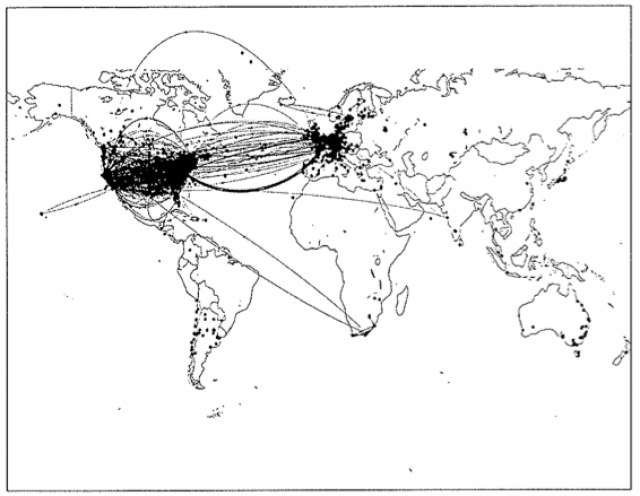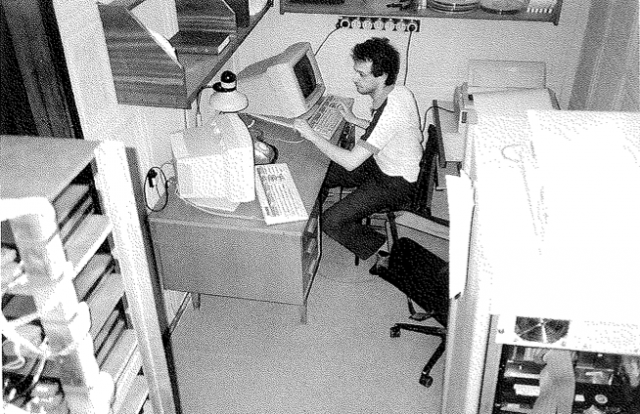How a handful of geeks defied the USSR
When twenty years ago Gorbatchev was faced with the challenge of a coup, only one channel was able to survive Soviet censorship. This is the story of how Usenet invented online activism.
OWNI is at SXSW ! For the occasion, we offer you some of our articles translated in English. Enjoy ! /-)
USSR, August 19 1991: While Mikhaïl Gorbatchev was on holiday in his datcha located in Crimea, Eight apparatchiks attempted to seize power over the state. Hostile to reforms, the “Gang of Eight” tried to prevent the Perestoika reforms and the loss of their satellite states. These eight orthodox Communists launched an attempted coup d’état by installing themselves as The State Committee of the State of Emergency. After Gobatchev returned he tried to restore order and save face, but it was clear that this episode would eventually lead to his downfall.
In this well documented event, there is an interesting historically episode which is often overlooked. During the two days of the coup the Russian media was shut down, and thus not covering Boris Yeltsin ranting on top of a tank for the crowd, nor the shock of the international community. All channels were blacked-out except for one; Usenet, which is the grandfather of chat-rooms and is capable or surviving without the Internet. For these precious 48 hours, a few dozen individuals contributed to this last means of communication with the outside world.
Information exchange with Helsinki
How did they manage to accomplish this feat? During the time, Relcom (Reliable Communications) was a small independent network which operated without state funding. It’s clients provided their own modems and paid a fee of 20,000 rubles for the service (similar to the current OpenLeaks project). Overall it connected 400 organizations in over 70 Soviet cities, using UNIX and Usenet to exchange information.

Usenet in 1991
In August 1990, Relcom partnered with EUnet, the ancestor of the Internet Service Providers. This small soviet project, rendered viable by Glasnost, was then accessible to the rest of the world. It connected to an office in Helsinkis, which exchanged information once per hour (a similar concept to the FDN project in Egypt). Ironically this initiative was made possible by the Kurchatov Institute of Atomic Energy, a prestigious Russian research program.
Thus the first cyber-activists were able to use this decentralized architecture and Usenet (developed in the USSR in 1982) to circumvent traditional censorship. The results resemble a more primal version of Twitter:
For those who are interested, Yeltsin’s declarations to overthrow Gorbatchev can be read on newsgroup Usenet talk.politics.soviet
<USENET> 11h45 – 3 divisions of the red army have rejoined the Yeltsin camp.
<Scofield> Information confirmed. Source: Radio City News, 15h GMT +3, Helskinki, Finland
<USENET> Posted on news-server@kremvax.hq.demos.su
<USENET> A man has been killed by the military in Riga, the night when Gorbatchev vacated Crimea
<USENET> An arrest warrent has been issued for Boris Yeltsin. It’s the first time. The source is NBC.
<Scofield> Information service in Finland – sent at 16h: The EU convened for an emergency meeting on Friday. Mitterrand tried to call Gorbatchev several times.
<muts> 200,000 protesters in Leningrad. 400,000 in Chisinau (capital of Moldova)
“They forgot”

Nearly twenty years before the coining of the term “Twitter revolution,” when the web didn’t really exist and the concept of an Internet connection at home was still in its infancy, Usenet was paving the road for the technology we depend on today. Yet with the situation in Egypt, it is hard to ignore the similarities; some users were told not to post information on the current political situation to avoid congesting the network. Polina Antonova, who worked at Relcom at the time, wrote this during the USSR coup d’état:
Don’t worry, we’re OK, though frightened and angry. Moscow is full of tanks and military machines, I hate them. They try to close all mass media, they shutted up CNN an hour ago, Soviet TV transmits opera and old movies. But, thanks Heaven, they don’t consider RELCOM mass media or they simply forgot about it. Now we transmit information enough to put us in prison for the rest of our life :-)
This excerpt, written while the USSR was rapidly dissolving, attests that there is a historical reality to the web being used as a tool in political struggles.
__
Photo credits: Relcom archives, Flickr CC iamtheo

Laisser un commentaire